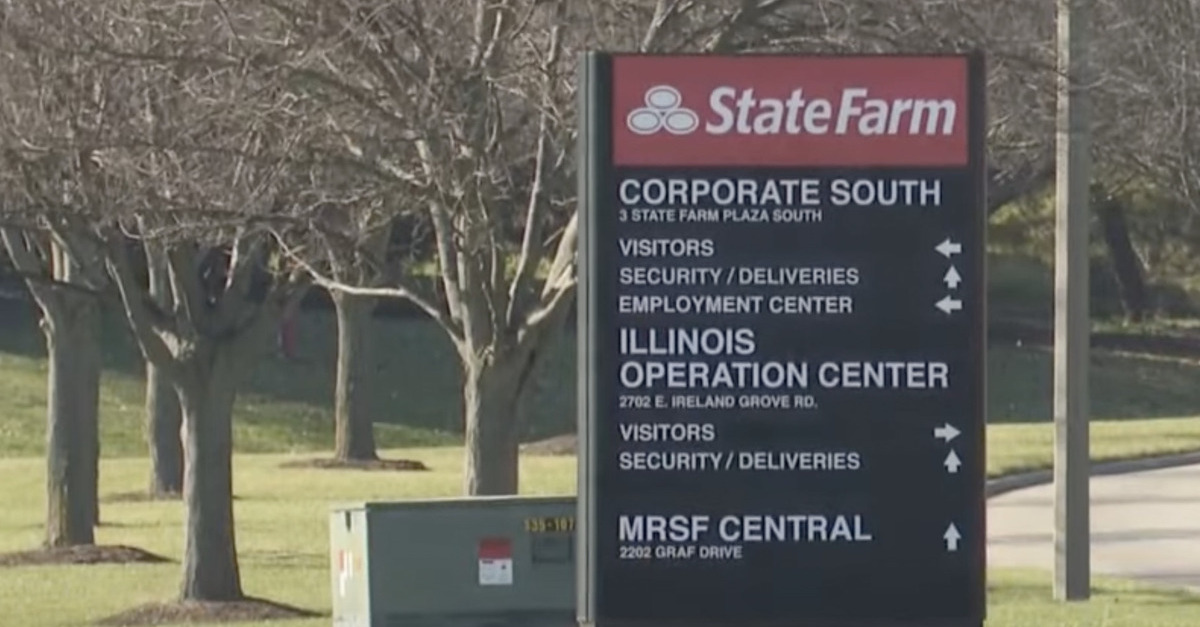
A State Farm building in Illinois is shown.
Jacqueline Huskey is a Black homeowner in Illinois who is suing State Farm for racial discrimination in its claims decisions.
Huskey filed a class action lawsuit Wednesday in federal court in Illinois. She says State Farm’s own data shows that the company processed claims slower, paid out claims less frequently, and subjected claims to greater scrutiny when the claimants were Black.
The lawsuit has potential to be groundbreaking, not only in scope — hundreds of unnamed plaintiffs may join Huskey once the case receives class action certification, exposing State Farm to hundreds of millions in potential liability — but also because of its reliance on the insurer’s allegedly discriminatory internal data-mining.
The 26-page complaint alleges that “claims made by Black homeowners are disproportionately subjected to greater suspicion than claims made by their white counterparts.” The company requests more documentation and more interactions with Black claimants, the complaint says, thereby causing slower payouts and increased inconvenience.
As a result, Huskey says, Black policyholders suffer a “detrimental impact to the value of their home and their quality of life as necessary repairs remain unaddressed for months on end,” which means that “Black State Farm policyholders receive a less valuable product than white State Farm policyholders.”
The data on which Huskey’s lawsuit relies is not simply anecdotal, but is supported by the company’s automated claims-processing methods. The complaint explains that State Farm uses algorithms to screen for potentially fraudulent claims, and to distinguish more complex claims from simpler ones. Huskey says these algorithms “rely on biometric data that function as proxies for race,” collect “intrusive behavioral data that function as proxies for race, such as geolocation, social media presence, and browser search history,” and use “historical housing and claims data that are themselves infected with racial bias.”
According to the plaintiff, taken together, State Farm’s data-collection methods and their results for Black homeowners constitute a violation of the Fair Housing Act (FHA).
As for Huskey’s own case, her roof was damaged by hail in June 2021. Though Huskey reported the claim (her first-ever claim with her insurer) promptly, State Farm did not respond for over a month. Over a period of four months, Huskey pursued her claim, but failed to reach an adequate resolution with State Farm.
Per the complaint:
As a result of State Farm’s delay, Huskey experienced further damage to her home — water damage to her kitchen and to two bathrooms caused by leaks in the unrepaired roof — and a decrease to her home’s overall value. She estimates that she has had 20 to 30 conversations with State Farm regarding this claim, including as recently as May 2022.
Huskey argues that modern data-mining practices are often inherently discriminatory and provides Amazon as an example of automated hiring practices resulting in biased decisions.
“Algorithmic decision-making and data analytics are not, and should not be assumed to be, race nor gender neutral,” Huskey argues in her complaint. “Too often, they reinforce and even exacerbate historical and existing discrimination.”
Specifically, Huskey contends that State Farm’s data shows that white homeowners were almost a third more likely than Black homeowners to have their claim processed expeditiously, that Black policyholders were 39% more likely to have to submit extra paperwork to justify their claims, and that Black policyholders were about 20% more likely than white policyholders to require three or more interactions with State Farm before claim resolution.
The FHA prohibits housing discrimination on the basis of race, color, religion, sex, familial status, or national origin. Not only does the statute’s prohibition relate to the sale or rental of a home, but it also prohibits discrimination in housing transactions such as loans, repairs, maintenance, or loss recovery.
“We take this filing seriously,” State Farm representative said in a statement to Law&Crime Wednesday. “This suit does not reflect the values we hold at State Farm. State Farm is committed to a diverse and inclusive environment, where all customers and associates are treated with fairness, respect, and dignity. We are dedicated to paying what we owe, promptly and courteously.”
In addition to an award of compensatory damages, the plaintiff asks the federal court to issue an injunction against State Farm to stop it from using its current automated claims processing system. Huskey also calls for the company to audit its system to neutralize any of its discriminatory effects.
Counsel for the plaintiff did not immediately respond to Law&Crime’s request for comment.
[screengrab via YouTube/WMBD News]
Have a tip we should know? [email protected]